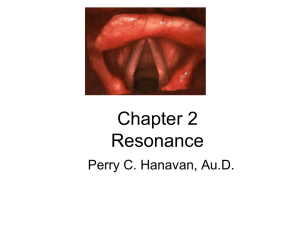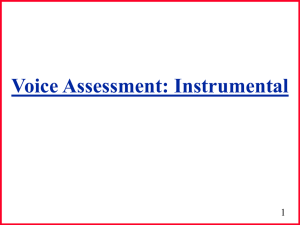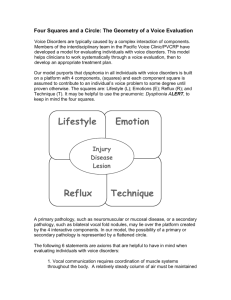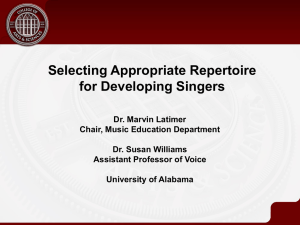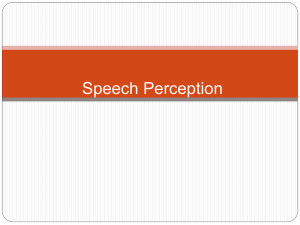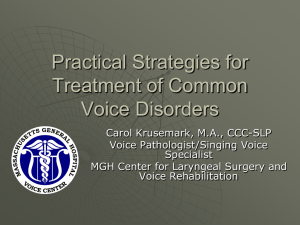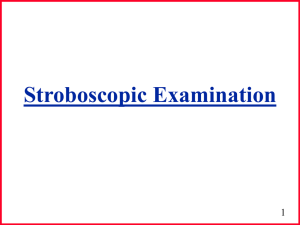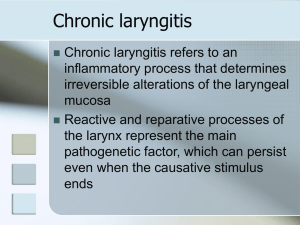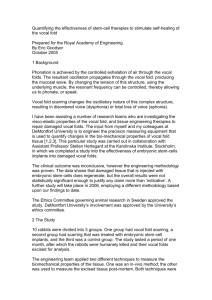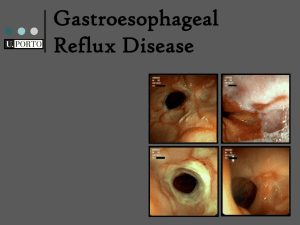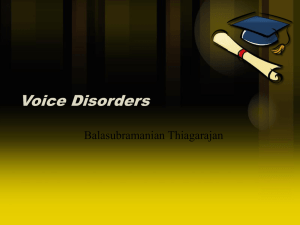The Vocal Pedagogy Workshop Stephen F. Austin, M.M., Ph.D
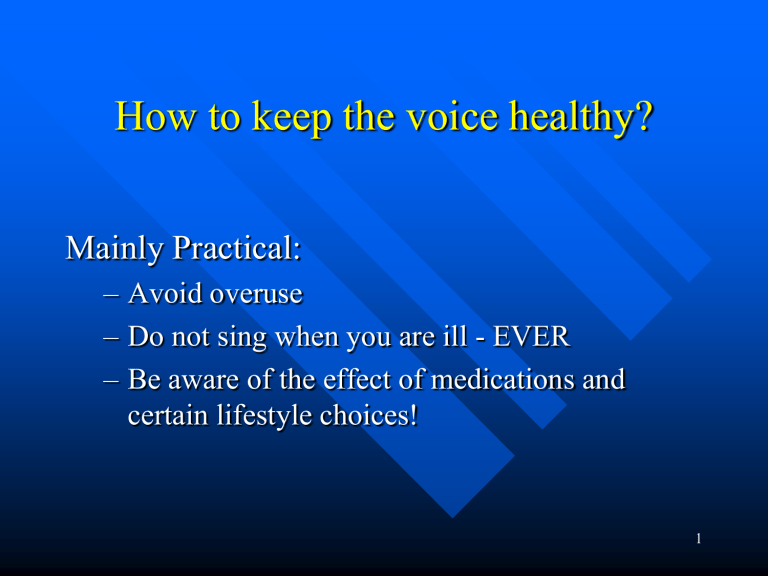
How to keep the voice healthy?
Mainly Practical:
– Avoid overuse
– Do not sing when you are ill - EVER
– Be aware of the effect of medications and certain lifestyle choices!
1
Avoid air born irritants
2
Avoid chemicals: household, garden, workplace, etc.
3
Avoid smoke!
4
Reinke’s Edema
5
Humidity
Avoid long exposures to dry air
–Air travel
– Heated/air conditioned bedrooms
Keep your body hydrated!
–Dr. Van Lawrence: “Pee Pale”
6
Molds, mildews, other allergens
7
Coffee
Avoid excessive diuretics
Chocolate
8
Overuse/misuse
Too much singing
– EVERYONE HAS THEIR OWN LIMIT
Too much talking: especially in noisy environments-CARS, AIRPLANES, BARS
Cheerleading, choir directing
CLASSROOM TEACHING
9
Hemorrhagic polyp
10
Hemorrhage
11
If you are ill and have to take prescription medications: http://www.ncvs.org/rx.html
Allergies/Colds
Treat the symptoms
– Nose Sprays
»Colds
: Pediatric strength Afrin. Limit to 3-5 days.
Alternate sides.
»Allergies
: Topical nasal steroids for seasonal symptoms: Beconase, Vancenase, Rhinocort,
Nasalide, etc.
13
Allergies/Colds
Treat the symptoms
– Antihistamines can be drying – find one that isn’t!
– Decongestants too – there are lots of them, find one that works for you
– Stimulants: can interrupt normal sleep patterns
– Mucolytics are helpful: reduce viscosity of secretions: Humibid, etc. (Guafinisen)
14
Sinusitis
Chronic low grade infection can lead to postnasal drip and throat clearing
May produce nasal discharge, obstructions, etc. that can interfere with performing
Must be managed medically
Chronic conditions can be addressed surgically
Can be associated with reflux!
15
Laryngitis with vocal fold injury
Hoarseness as a result of trauma
– Cough, sneeze, yell – a singular event!
– Vocal fold inflammation
– Mucusol disruption or hemorrhage
Voice use is contraindicated
– Often seen in premenstrual women using aspirin
– Optimal therapeutic approach in not clear
16
Laryngitis without vocal fold injury
Vocal fold edema resulting from infectious or non-infectious causes
Voice rest is not necessarily indicated
Overuse, misuse and many URI
Treatment includes: selective voice use, hydration, mucolytics, corticosteroids, etc.
No whispering!
17
Acute Laryngitis
18
In case you missed it: or I didn’t say it…
Aspirin is contraindicated in professional voice users.
– Causes platelet dysfunction
– Predisposes to vocal fold hemorrhage
– Acetaminophen is best substitute (Tylenol)
19
Hormones in the singer
Huge implications for voice
Puberty
Normal female cycle
Endocrine issues: thyroid, fluctuation in sex-hormones
Menopause/Manopause
Induced: anabolic steroid ingestion
– Athletes
– Medical treatments
20
Menstrual cycle
Women can experience moderate to severe voice disorders related to monthly ovarian cycle.
– Most in immediate pre-menstrual period
– Loss of range, fatigue, slight hoarseness
– Due to engorgement of the vf and changes in the mucosal lining of the vf
21
Menopause
Changes in the voice vary widely:
Menopause is associated with changes in the laryngeal mucosa.
Register transition difficulties
Breathiness, weakness, lack of flexibility, lack of support, loss of range, change in vibrato, pitch inaccuracies
22
Menopause
Post-menopause pitch drop due to little or no estrogen secretions.
WHILE the ovaries continue to produce androgens. This results in virilization.
35-40 yo performers should have baseline estrogen levels for later reference.
23
Menopause
Replacement therapy should be guided by a gynecologist, endocrinologist, and a laryngologist.
Traditional methods have shown to be risky
HOWEVER non-traditional replacement therapies with bioidentical hormones are worth investigating! Read Suzanne Somers
Androgens should not be given to a singer if there is a reasonable therapeutic alternative.
Androgens are found in some European birth control pills.
24
Manopause
Not just for those of us who live through it vicariously!
Testosterone levels begin to fall about 1% each year after age 30
This has not been investigated in the singing voice
Male pitch tends to rise with age: women’s lowers: Is it grama or grampa on the phone?
25
Hypothyroidism
Thyroid gland regulates protein synthesis and tissue metabolism.
Thyroid disorders are common in the population (<4%).
– Unexplained hoarseness
– Vocal fatigue
– Muffled sound
– VOCAL FATIGUE!
26
Hypothyroidism
Symptoms:
– Loss of range
– Feeling of a lump in the throat
Can occur when tests are within the low-normal range.
Surgical complications are real:
– Severed recurrent laryngeal nerve = paralysis
27
Gastric Reflux (GERD)
Stomach contents spill out over the larynx.
Gastric acid irritates the mucosa
High incidence in voice complaints
– Satoloff (1991) 50% of voice patients
– Koufman (1996) 78% with hoarseness
28
Gastric Reflux (GERD)
Symptoms:
– Morning hoarseness
– Prolonged warm-up time
– Halitosis
– Excessive phlegm
– Frequent throat clearing
– Dry mouth
29
Gastric Reflux (GERD)
Symptoms:
– Coated tongue
– Sensation of a lump in the throat
– Throat tickle
– Dysphagia
– Chronic sore throat
– Heartburn – not always!
30
Gastric Reflux (GERD)
Physical exam:
– Erythema (reddening) & edema
(swelling) of mucosa around the arytenoids, false folds and posterior portion of the true folds
31
32
Gastric Reflux (GERD)
Diagnosis:
– Examination by gastroenterologist
– Ph monitor (24 hours)
My diagnosis: Assume that you have it, treat it and save yourself $$!
33
Gastric Reflux (GERD)
Rx can include:
– Elevation of the head of the bed 6 inches
– Drug therapy: Prilosec, Privicid, Nexium, etc.
– No eating 3 to 4 hours before bed
– Avoid coffee and alcohol other ‘hot button foods: CARBOHYDRATES
Surgical interventions very common
34
Vocal Nodules
Benign growths on vibrating margin of the vocal folds.
Usually bilateral and symmetric.
Caused by chronic, forceful vf contact.
Always at midpoint of membranous vf
Increases mass – makes them stiff
Always the result of abusive behavior
35
T
Nodules
36
37
Vocal Nodules
Symptoms:
– A change in vocal quality
– Breathiness
– Loss of range
– Vocal fatigue
– Aphonia in certain parts of the range
38
Vocal Nodules
Often confused with cysts and other lesions without a proper diagnosis:
Strobovideolaryngoscopic exam
Recent onset nodules can resolve
Old nodules do not respond to therapy, but therapy should be done prior to surgery.
39
Other ‘space occupying lesions:
40
Cyst
41
Polyp
42
Vocal Nodules
Can be successfully removed with good result.
Any surgical procedure can leave a scar, and a scar means dysfunction (Julie
Andrews).
Vocal fold stripping is absolutely considered malpractice today.
43
Other horrifying things: fungal infection
44
Dislocated arytenoid
45
46
Vocal Health Web Sites
http://www.bgsm.edu/voice/
http://www.hopkinsmedicine.org/voice/
http://www.voice.meei.harvard.edu/disorder s/
http://www.ncvs.org/ncvs/info/vocol/rx.htm
l
47





